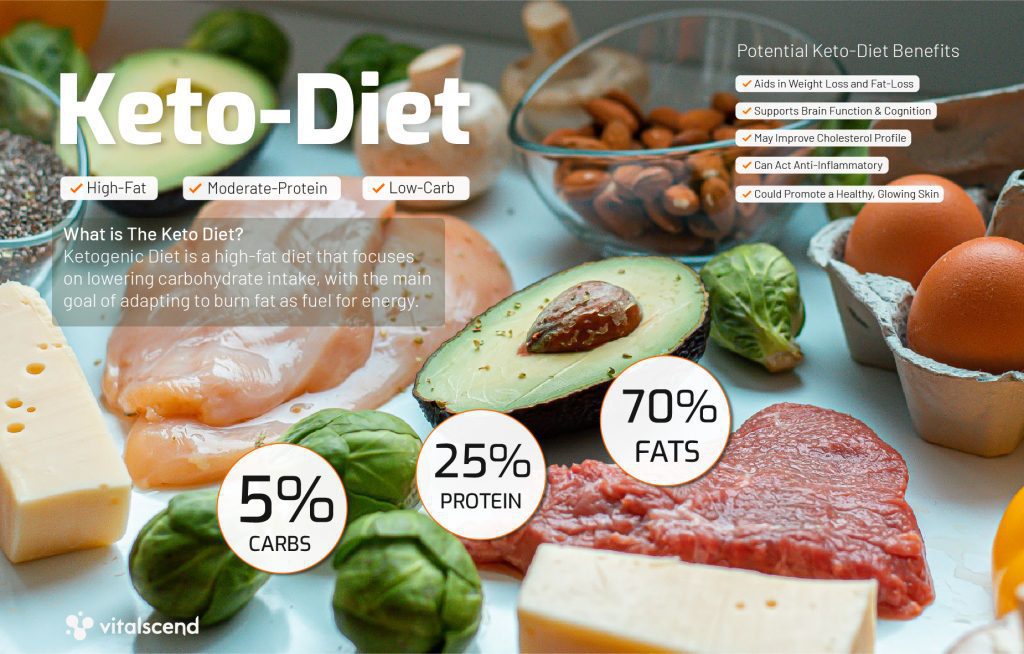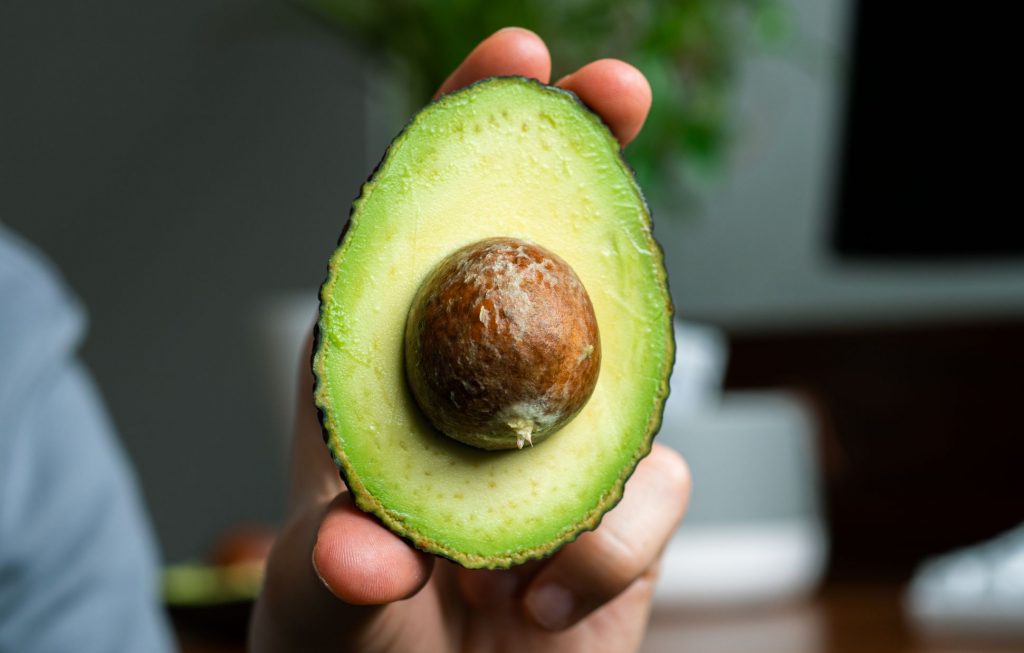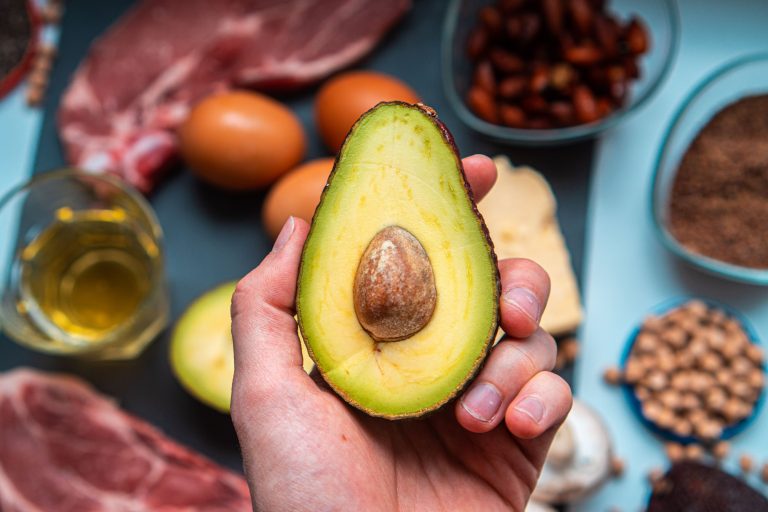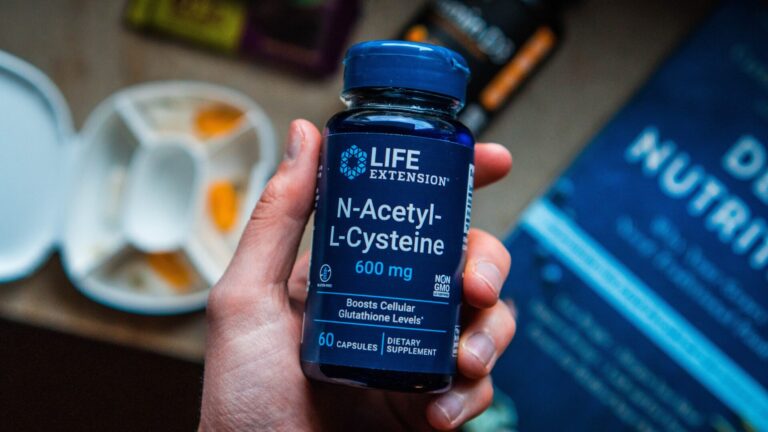Top 14 Effects of Keto Diet: Weight Loss, Cognition and Anti-Aging
Keto is one of the most popular weight loss and brain performance diets out there. There are numerous effects of keto diet that mainly enhance our metabolic flexibility, making the body more efficient in switching between fat and glucose for energy. This can boost alertness and mental clarity, increase energy, and make us fat-burning machines.
Questions like: ”What are the benefits of a Keto diet”, or “Is Keto good for the brain”, or “Is the Ketogenic diet good for weight loss” or “How does the Ketogenic diet work” will be answered throughout the article. You will also learn some practical tips for a healthy ketogenic approach & fat loss, why you get brain fog, and how to prevent the Keto flu.
The Keto Diet
- The Keto diet is a high-fat, low-carbohydrate, moderate-protein diet.
- It relies mostly on low-carb veggies and fruits, nuts, meats, poultry, seeds, butter, and oils.
It has become very popular in modern times, being promoted as one of the best weight-loss diets.
The ketogenic diet was created for epilepsy treatment and is usually confused with the Atkins diet, which is a slightly less carb-restrictive diet than Keto.
Looking at the Macronutrient profile of the Keto Diet:
- 70% of calories are fats
- 25 % of calories are proteins
- 5% of calories are carbohydrates
We can see it is a pretty carb-restrictive and fat-enriched diet, but why would anyone switch to Keto? Well, there have been many claims that this diet is pretty powerful in accelerating fat loss, improving brain function, anti-aging, and reducing inflammation.
Keto works on different mechanisms that allow the body to reset its glucose metabolism and insulin levels, which can provide beneficial effects on carbohydrate absorption and efficient use of energy while diminishing sugar cravings.
Most of the Ketogenic effects originate from carb restriction, which in turn reduces inflammation, thus improving overall health
For better perception we will split these Keto effects on the body into two sections:
- Performance improvement (brain, fat loss, heart health, skincare, inflammation)
- Potential disease prevention or improvement (type 2 diabetes, PCOS, Metabolic Syndrome, Cancer, Epilepsy, and Neurodegenerative diseases)

How Does The Ketogenic Diet Work?
A ketogenic diet puts you in sugar-starvation mode because your carbs have been restricted and significantly reduced. This will allow the body to use fats as the main fuel for energy instead of glucose. The goal state we’re aiming at is called the “ketogenic state” or “ketosis”.
- If you are a Keto-Fan and want to dive deeper in the Ketogenic stream of knowledge, make sure you also check out our Keto-Diet 101 Guide: Macronutrients, Foods, Supplements, Meal Plan & Side Effects + Ketosis Biohacks
Ketosis is a metabolic state in which the levels of ketone bodies or ketones are raised. This is a natural response of the body when the glucose supply isn’t sufficient enough for energy production.
When you don’t have enough glucose in your blood, the next fuel source is fats, so your body starts burning your fat for energy. The liver starts breaking down fats to produce more ketones, which serve as the main energy source now.
What Are Ketones?
Ketone bodies are water-soluble molecules or chemicals produced by the liver from fatty acids, when sugar content is too low, which is present during carbohydrate restriction or fasting.
There are three main ketone bodies:
- Acetone
- Acetoacetate
- Beta-hydroxybutyrate
Most of the foods present in a healthy keto diet are rich in MCTs because they can be converted into ketones faster and easier. MCT oil is one of the richest sources of MCTs which can accelerate fat-burning and get you into ketosis faster.
Ketones vs Glucose
Using fats as the main fuel has different effects on the whole body, metabolism, hormones, and energy levels.
Everyone starting the Keto diet must understand what they are doing and how to do it right.
Pro Tip
How do you know you are in a state of ketosis? Well, testing your blood or urine for ketone levels is one way, for which you need a blood testing meter. If ketone levels are above 0.5 mmol/L, you are in a Keto state.
Now Ketones are beneficial for your brain and can improve mental performance, alertness & focus, but how do they affect overall physical performance and exercise capacity?
Well, it looks as if ketones and glucose have some significant differences as energy fuel. So let’s take a look at ketones vs glucose for the brain.
| Keto-fueled brain | Glucose-fueled brain |
| Improved cognitive function | Better performance at stressful tasks |
| Better neuroprotective effects, antioxidants | Improved attention span and refocus speed |
| Mental clarity and alertness | Improved mood, dopamine reward sensation |
| Higher energy efficiency | Better exercise performance |
| Improved learning and memory | Improved short-term and implicit memory |
My main point is both options can be great, just for different activities. The glucose-powered brain is usually what the majority of the population is enjoying. You are in a good mood, feeling satisfied, concentrated, bursts of energy, good short term memory, and learning skills.
However, excessive sugar consumption leads to inflammation and sugar cravings which can be detrimental in the long run. So this is why choosing Keto as a reset for 1-3 months might be a good idea, since the Keto diet restores appetite centers and it makes your brain more alert, focused, calm, and energized (without the crash).

Top 14 Keto Diet Benefits
Besides rapid weight loss and improved brain function, the Keto diet has many other health-promoting benefits for the body.
For better perception I will split these Keto effects on the body into two sections:
- Performance improvement (brain, fat loss, heart health, skincare, inflammation)
- Potential disease prevention or improvement (type 2 diabetes, PCOS, Metabolic Syndrome, Cancer, Epilepsy, and Neurodegenerative diseases)
1. May Promote Weight loss And Accelerate Fat-Loss
A lot of studies on Weight loss confirm the potential effect that Keto can produce.
Is a Ketogenic diet good for weight loss?
Ketogenic or Low-carb diets have been shown to be effective for weight loss more than high-carb or conventional diets.
- In this study on 53 healthy obese females, the low-carb diet group lost significantly more weight and fat in comparison to the low-fat diet in the short term. (1)
- Comparing conventional diet and low-carb, low-carb diet performed better in the long term (1 year) for weight loss. (2)
- In energy-restricted diets, a very low-carbohydrate ketogenic diet performed better than low fat on weight loss, fat mass, and body composition. (3)
Some of the underlying mechanisms behind Keto’s weight loss effects are:
Fat Oxidation
Energy Expenditure
Suppressed Appetite
Calorie Burn
Conversion
Increased Fat-Oxidation
In order for the body to produce ketones as an alternative energy source, it breaks down its fat in the liver. This increases further fat oxidation which leads to fat loss if sugars are not present. At the same time that excess fat is burned, we spare lean muscle and improve insulin sensitivity. (4)
Increased Energy Expenditure
Another famous term for this is “faster metabolism” or how many calories you burn. Higher protein intake in a Keto diet can improve energy expenditure, which enhances the weight loss effect. Switching to a Keto diet, from a high-carb diet has shown beneficial effects and an increase in energy expenditure. (5)
Suppressed Appetite
Ketogenic diets are known to reduce sugar and carbohydrate cravings, due to their satiety-increasing effect because of the high-fat content. Reducing hunger cravings can significantly improve weight loss since people feel full and energized longer without craving sugars. This study supports the evidence of weight loss and hunger-suppressing effects of Keto. (6)
Extra Calorie Burn
When an excessive amount of sugars is consumed, they are converted to triglycerides. When you cut sugars out, there is no sugar to be converted into fat. Plus Keto diet has been shown to burn more calories because of the potential gluconeogenesis, which is converting fat and protein to glucose. (7)
Reduced Carbohydrate Conversion To Fat
Cutting carbs out is a characteristic of the Keto diet. This means excessive sugars can not be converted into triglycerides anymore, since you don’t eat them. (8)
summary
Keto diets can be an effective way to lose weight and accelerate fat loss. Although this efficiency comes at a certain cost, Keto diets may be more effective than moderate-carb calorie-restricting diets, in the short term only. Keto burns fat through increased fat oxidation, reduced carbohydrate-to-fat conversion, and suppression of appetite.
2. May Improve Brain Performance & Cognitive Function
I have stumbled upon terms such as “Keto brain” or “Lean Brain” and questions asking whether Keto brains are actually healthier and more efficient.
Effects on focus, memory, learning & alertness
When we strip glucose off in your blood, there is no insulin to come pick it up and bring it to your brain. This is the sugar starvation mode. Luckily, your brain can use ketones made by your liver, which break down fats.
The so-called Keto brain is brain fueled on fats, typical for Keto eaters.
How can Keto improve your brain performance and why is it better than glucose?
Glucose is not bad by any means, but excessive consumption of processed sugars is. Your brain can function great even on a high carbohydrate diet, but Keto eaters have reported a lot of improvement in energy sustainability, improved mental performance, awareness, and alertness as well as focus & concentration.
How the Keto diet affects your Brain?
Fueling your brain with ketones can be a great strategy to improve your learning ability, mental focus, and alertness. But more than that, Keto may be healthy for your brain.
Your brain is made up of nearly 60% fat, one of the fattiest organs in your body. Your brain needs fat in order to function at an optimal level, however, the type of fat matters a lot.
A Keto diet that provides high amounts of omega-3 fatty acids is very important. Keeping the ratios of omega3 to omega6 somewhere around 1:1 to 1:4 is a great balance. Usually, unhealthy keto eaters or people on the typical western diet can throw this ratio out of balance by providing so high amounts of omega 6 that changes this ratio to 1:15 or even twice that. This can hinder your brain performance by increasing inflammation.

Keto Benefits on the Brain
Improved Focus
Your main excitatory neurotransmitter is Glutamate. Overstimulation can cause excess glutamate to build up which will hinder the function of GABA, the main inhibitory neurotransmitter. Ketogenic brains are better at removing the excess glutamate by converting it to glutamine which can help your brain focus, fight stress, and prevent overstimulation. (9)
Enhanced Memory
In 23 older patients with mild cognitive impairment, ketosis improved their verbal memory performance while at the same time providing multiple beneficial effects on weight and glucose metabolism. Levels of ketones were correlated with memory performance. Improved memory was believed to be due to reduced inflammation and improved energy metabolism. (10)
Improved Cognitive Function
A couple of studies focused on the effects of keto on the brain of children with cognitive impairment. Reports show that keto was beneficial in improving cognition, focus, alertness, and attention while reducing the frequency of seizures in children. (11) (12)
Age-Related Cognitive Decline Support
As we age, the ability to utilize glucose for energy in the brain is reduced. Interactions in the hippocampus and prefrontal cortex are crucial for behavior, memory, and planning. In rats, the ketogenic diet increased cognitive performance and MCT1 and MCT4 ketones transporters, while reducing GLUT1 (glucose transporter) which may be beneficial in enhancing large-scale network brain function. (13)
May Promote Neurogenesis
Neurogenesis is the process of creating new neural cells or neurons. When we are learning something, new neural pathways or connections are formed. The learning ability or the brain’s adaptability is known as neuroplasticity, and neurogenesis plays a major role in it. Mice fed with ketogenic diets have shown improved neurogenesis after kainic acid-induced seizures. (14)
summary
Fueling your brain with ketones may improve cognition, memory, focus, learning, and neurogenesis. The ketogenic diet has neuroprotective potential mainly due to its anti-inflammatory effect.
3. Supports Cardiovascular Health
Is it true that a high-fat diet can improve cholesterol profile and cut the risk of cardiovascular disease?
Effects on cholesterol, blood pressure, and blood sugar
Well, there is some research to support the evidence of keto and its effects on some markers that are associated with coronary diseases. However, most of the Keto success stories are seen in healthy keto eaters, not the ones that power up on bacon and butter of course.
Based on research from human and animal trials, the keto diet has been shown beneficial in improving some cardiovascular risk factors such as type 2 diabetes, obesity, and HDL levels. (15)
Besides this, many fat-soluble vitamins that are crucial for the heart and blood vessels are higher in the Keto diet, plus the high-fat profile enhances their absorption. Heart-healthy nutrients rich in Keto are Omega 3 fatty acids and vitamin D.
Potential benefits of Keto diet on Heart health.
Increase in HDL, Reduction in LDL and Triglycerides
The ketogenic diet was found beneficial for improving cholesterol profile. Lowering LDL and increasing HDL “the good cholesterol” has been shown to increase lifespan by reducing the risk of developing cardiovascular disease. A ketogenic diet was shown to increase HDL, and reduce LDL & triglycerides as well as blood glucose levels in obese patients. (16)
May Lower Blood Sugar and Insulin Levels
Diet high in saturated fat and very low in carbohydrates was tested on 83 subjects for 8 weeks. The results of these studies confirmed that the keto diet had a significant effect on lowering fasting insulin, blood pressure, and fasting glucose levels, which suggests the potential use of keto for short-term weight management and insulin resistance. (17) However, if keto is performed for type 2 diabetes patients, they should be under medical supervision since keto might significantly lower blood glucose. (18)
May Reduce The Risk Of Coronary Diseases
Carbohydrate restriction can alter lipid metabolism, especially the metabolism of lipoproteins, by modifying LDL, HDL, and VLDL in overweight men. In this study, 29 men ate a high-fat diet consisting of 65% fat, 10% carbs, and 25% protein for 12 weeks. They were separated into the placebo and experimental groups. The carb-restricted group showed improvements and decreased risk for atherosclerosis and coronary diseases. (19)
May Lower Blood Pressure
The ketogenic diet includes foods such as avocados, Swiss chard, broccoli, and mushrooms which are pretty high in potassium. This mineral plays a major role in reducing blood pressure by promoting fluid balance. (20) Low-carb diets were efficient at lowering blood pressure, dropping the systolic by 5.9 mmHg and diastolic by 4.5 mmHg in overweight patients. On top of all, many participants lost up to 10% of their body weight and reduced their blood pressure medications use. (21)
summary
Keto diet may reduce the risk of cardiovascular disease due to its beneficial effects such as: improving cholesterol profile, reducing LDL and triglycerides, increasing HDL, and lowering blood pressure, and blood sugar levels.
4. Potent Anti-Inflammatory Properties
The Ketogenic diet provides many foods that are rich in Omega 3 fatty acids, which play a major role in reducing inflammation.
There is nothing wrong with inflammation, it is a regular process that happens in the muscles during exercise, in the brain while you are doing high-demand cognitive tasks, etc.
You may have heard that majority of today’s diseases originate from inflammation, and that is true. But when we refer to inflammation, it is the basic response needed to stimulate regeneration that our cells can overcome and fight against, so that we adapt.
A ketogenic diet can even further improve this effect by :
- Reducing the cause of inflammation, one of which is excessive sugar consumption
- Providing powerful antioxidants, such as vitamin E, vitamin A, and Omega 3 fatty acids
The ketogenic diet can potentially reduce inflammation by:
Improving mitochondrial respiration
When you are in a state of ketosis your body produces higher amounts of a ketone known as BHB or B-Hydroxybutyrate which reduces oxidative stress and improves mitochondrial function. (22)
Inhibiting Inflammation Pathways
By activating the AMPK pathway ketogenic diet can reduce inflammation by inhibiting nuclear factor kappa-light-chain enhancer of activated B cells known as the NF-kB pathway. Most of the neuroprotective effects of the Keto diet rely on its anti-inflammatory properties. (23)
Reducing Markers Of Inflammation
In a state of Ketosis, there is even evidence of reducing the CRP which stands for C-reactive protein, one of the main inflammation markers. The Keto diet looks like a safer alternative for cholesterol and inflammation reduction compared to other statin drugs. (24)
In order to improve these anti-inflammatory effects, you might want to do some switches in your daily Keto routine by changing the foods you eat.
Include more foods high in Omega 3’s with potent antioxidant activities such as green leafy vegetables, avocado, ginger, macadamia nuts, salmon, Swiss chard, olive oil, eggs, cauliflower, and herring.
Reduce your food intake of processed meat and oils such as Corn oil, soybean oil, safflower oil, bacon, corned beef, duck, ham, sausages, and canned meat.
summary
The ketogenic diet may be efficient in reducing inflammation due to carb restriction and the addition of antioxidant-rich foods with many anti-inflammatory properties, mainly due to the presence of Omega 3 fatty acids.
5. Could Promote Healthy Skin
A ketogenic diet can be great for the skin if you eat properly. (25)
If you stack up on butter, unhealthy oils, and a bunch of processed meats – expect the exact opposite.
Clear, Healthy, and Youthful looking skin
Acne is triggered by inflammation in the skin and hormonal imbalance. A healthy ratio of omega3:omega6 can help with skin clearance and potentially reduce acne problems.
Natural Oils for the skin
Healthy oils in the Keto diet can provide the skin with all the needed nutrients and oils for its natural oiling. However, be aware that too much oil can be detrimental to the skin and cause inflammation.
Reducing Inflammation
Cutting off the main dietary source causing acne like processed carbohydrates, can initially help in clearing out red skin, acne, and breakouts. Other factors inducing inflammation besides sugars are stress and smoking, so taking care of these two might help too.
Potential Anti-Wrinkle effect
Aside from this, the Keto diet can theoretically improve skin health and make you look younger, due to its inflammation-reducing effects which go hand in hand with decreasing oxidative stress and damage being on of the main causes of aging. That being said, there is potential for healthy fats to promote positive anti-wrinkle effects on the skin during carb restriction.
Highly Nutritious for the Skin
One of the main benefits of the Keto diet for the skin is nourishment. In fact, many Keto-friendly foods such as Peanuts, sunflower seeds, almonds, avocado, avocado oil, Swiss chard, spinach, butternut squash, herring, salmon, tuna, mushrooms, and egg yolks are pretty high in fat-soluble vitamins that are important for healthy skin.
Vitamins like Vitamin A, Vitamin E, and Vitamin D are present in these foods and can promote many benefits for the skin such as pigmentation balance, skin regeneration, reducing inflammation, UV damage, and photoaging. (26)
Keto for Skin
Keto: Skin Rash
Keto for Skin: It can be great and it can be really bad, depending on a lot of factors, some of which are under your control. Eating unhealthy fats while reducing carbs can potentially worsen your skin appeal and acne when eating a well-balanced, high antioxidants (vitamin E) and omega 3 enriched ketogenic diet can reduce inflammation and promote great-looking, youthful skin.
Keto Skin Rash: Be aware that switching to a Ketogenic diet and significantly reducing your carbohydrate intake may negatively impact the skin in the adaptation phase or the early stage of ketosis. Known as Prurigo pigmentosa or a keto rash, this is a form of skin inflammation or inflammatory dermatitis that some people may experience.
summary
The ketogenic diet may improve skin appeal, and potentially reduce aging and wrinkles due to reduced oxidative damage. However, unhealthy oils in the keto diet can worsen symptoms of acne, breakouts, and redness. So aiming for high vitamin E, and omega 3 keto foods can ensure you support healthy skin.
Potential Effects of Keto Diet On Reversing, Treating, Or Preventing Diseases
Keto Diet was developed in the 1920s to treat pediatric epilepsy. The classic Keto diet has a ratio of 4:1 of total fat to carbohydrate and protein ratio. As you may have figured it out, Keto may potentially improve epilepsy due to its ability to regulate the excitatory neurotransmitter Glutamate and convert it into glutamine. Keto brains, because of the inhibitory neurotransmitter GABA can then rest, calm down and regenerate.
A couple of other benefits from using the Keto diet in these patients were observed so the benefits and uses of the diet shifted a little bit. Some of the major causes of death are cardiovascular disease, obesity, diabetes, and cancer. The Keto diet has shown some potential in improving blood markers associated with these diseases.
Disclaimer: You should consult with your doctor/nutritionist before starting out a Keto diet program. This website is created to provide you with educational content only and NOT to replace medical advice. By potential effects, we mean possibility. Even though there is some existing research, we need further investigation in humans for the correct diet program. Always consult with your doctor regarding specific health questions or medical conditions.
That being said, the ketogenic diet might have the potential to attenuate, prevent, delay, or reduce symptoms of:
6. Type 2 Diabetes
A low carbohydrate ketogenic diet caused significant improvements in glycemic control in obese diabetic subjects. This study involved 363 overweight and obese people who chose either a ketogenic or low-calorie diet. The ketogenic diet improved many parameters such as triglycerides, LDL, HDL, body weight, body mass index, weight circumference, fasting glucose, and creatinine. In 24 weeks, both LCD and LCKD improved many markers related to type 2 diabetes. (27)
There are even reports showing that patients with type 2 diabetes have discontinued or reduced their medications due to the effects of the Ketogenic diet on lowering blood glucose levels. (28)
It is important to note that patients on diabetes medications must practice the Keto diet under medical supervision since it can drastically lower blood sugar levels.
7. Non-Alcoholic Fatty Liver Disease
Fatty liver disease is linked to obesity and increased cholesterol. Reducing weight and inflammation in these individuals may positively affect health and reduce symptoms. For 6 months, five patients with an average BMI of 36.2 kg/m(2) followed a low-carb diet (<20g/day) with proper supplementation. On average they lost 12.8 kg and 4 out of 5 showed improvement in liver fibrosis, inflammatory grade, and steatosis. (29)
8. Potential Anti-Cancer Properties
Consumption of sugars leads to insulin secretion, which affects hormones such as HGH and IGF-1. These can potentially be detrimental to people with cancer, hence why limiting the sugars through fasting or keto diet may be beneficial. The Keto diet was shown to improve mitochondrial function, which is hindered in cancer cells and disrupts energy production (ATP cycle). Aside from this, the energy we get from ketones is more efficient, per unit of oxygen. So combining the Keto diet with chemotherapeutic and radiotherapeutic options may improve tumor response. (30)
9. Osteoarthritis & Joint Pain
Adults in their sixties and seventies were asked to follow a low-carb or low-fat diet to examine the effects on functional pain. A low carbohydrate diet was shown to reduce pain intensity and unpleasantness in functional tasks. The effect is believed to be due to reduced oxidative stress and inflammation. (31)
A high-fat diet can provide omega 3’s which work anti-inflammatory, plus a low-carbohydrate diet will lack the processed sugar that mainly causes inflammation, so reducing arthritic pains with Keto may be a healthier alternative for opioids.
10. PCOS or Polycystic Ovary Syndrome
In this study, the Keto diet was shown to improve metabolic markers and promote endocrine balance. This can be helpful for women with PCOS, which is linked to obesity and insulin resistance.
For 24 weeks, 11 women with a BMI of >27 kg/m2 have limited their carbohydrates to 20 grams/day (or less). Dropping carbs allowed them to lose up to 12% body weight, -22% free testosterone, reduce LH/FSH ratio by -36%, and fasting insulin by -54%. (32)
11. Alzheimer’s Disease
A ketogenic diet can also be beneficial for preventing neurodegenerative diseases due to reduced inflammation, especially in the brain. By improving mitochondrial function, balancing neurotransmitters, and modulating signaling changes, Keto can positively affect the AD brain. (33) One of the major problems in neurodegeneration besides oxidative stress is impaired glucose metabolism, that carb-restrictive diets can reset.
12. Parkinson’s Disease
A ketogenic diet has improved urinary problems, uncomfortable sensations, fatigue, and daytime sleepiness in patients with PD. For 8 weeks this diet was safe, plus it improved motor and nonmotor symptoms. (34)
13. Metabolic Syndrome
Ketogenic diets, because of the carb restriction can potentially improve all the symptoms in metabolic syndromes, such as high triglycerides, low HDL, high blood pressure, elevated blood sugar levels, and visceral fat. (35) (36)
14. Cardiovascular Diseases
A ketogenic diet can be great for the heart too if done properly. There is evidence that shows how Keto can cut the risk of developing coronary diseases, due to improving blood pressure and cholesterol profile. Plus Ketogenic diet can assist in weight loss which is very beneficial for heart health. (37)
Why is the ketogenic diet becoming so popular?
Any diet or supplement that has a specific characteristic, can become very trendy. The idea that keto diet allows eating fats, while resulting in fat-loss is unthinkable to many, hence why it spikes their interest so much. It is a fairly popular diet, one of the most frequently talked about in fat-loss, endurance and diabetes-management areas.
How long does it take to get results from the keto diet?
Although it seems as keto diet will bring results fast, the weight-loss effect of keto is partially due to water loss. Keto is no superior to moderate or high carb diet in terms of how fast we can lose weight in the long term. It actually provides more calories per the same food volume, as fats (which are keto main target) offer 9 kcal per 1 gram, while carbs offer 1kcal per 1 gram. That being said, it works well as a short-term or reset diet, but in weight loss, it all comes down to calories in vs. calories out.
Is combining the keto diet with intermittent fasting good?
Combining the two may actually help the body get in ketosis faster, as the body has no glucose for a longer duration of time. As we fast (or don’t eat glucose) insulin levels and glucose drop low, allowing the body to use fats for fuel more efficiently, hence why we get into ketosis faster. To summarize, it can be effective to combine them both, but definitely not necessary for weight loss.
Potential Negative Side Effects Of The Ketogenic Diet
The ketogenic style of eating comes with many potential health benefits for some people. However, it is just as important to consider the potential drawbacks of eating Fat Dominant diet.
Acute (Short Term)
It really depends on the consumer, eating, and lifestyle habits, etc. Here are a couple of potential drawbacks or precautions for the Ketogenic Diet:
- Lower Energy, Higher Fatigue which is a part of the adaptation phase presents with many restrictive diet, especially the low carb ones. It can affect energy levels and metabolism. Usually, people feel less energized, more tired, and fatigued, falling down along with their sex drive.
- The Keto flu is another state keto eaters can experience for which irritability, weakness, fatigue, headaches, and even nausea, vomiting, and constipation are characteristic.
- Other Side Effects that come as a result of lowering your carbohydrates are dizziness, inability to focus, loss of concentration, stomach cramps, low libido, and so on.
- Yo-yo effect – a popular self-preservation mechanism. If you have restricted your calories and did not keep up with it, after some period your body will want all of this fat back, and even more.
Research Limitations
*Studies have some limitations, important to evaluate the validity of their results. Here’s a highlight of some and NOT ALL studies (and limitation), shown in this article, for context.
High dropout rate of 30%+ by participants, lack of control group.
Studies with small to moderate sample sizes, hard to generalize.
Studies which only include one gender (male or female)
Further research needed for long-term adherence and practical application.
Study includes Low-carb diet, but doesn’t measure ketosis.
Unclear evidence on long-term low-carb diets and mortality risk.
Aged data analyzing reports older than 20 years.
Most studies are done in obese (and/or diabetic) individuals, hard to generalize.
Lack of randomization and reduced comparability.
Disclaimer: Ketogenic diet has not been proven for the long term and there are potential drawbacks to eating the Keto diet for more than 3-6 months.
Is the ketogenic diet healthy?
The answer to this question is both yes and no. It really depends on the consumer.
The ketogenic diet may help with insulin resistance, stabilizing blood pressure and sugar levels, mental alertness, brain function, and weight loss.
In my opinion, Keto is one of the best reset diets, acting on glucose and lipid metabolism. However, I personally would not recommend anyone to stay on a Keto diet longer than 6 months, since the long-term effects are not studied so well and might cause some serious side effects.
In terms nutrients wealth, the Keto diet can be a healthy diet if you consume the right foods in the right amounts. Adding a good amount of healthy fats to your body can help with hormone production, cardiovascular health, weight loss & fat-loss, inflammation, and fat-soluble vitamin absorption.
Make sure to stay away from unhealthy oils and processed meats and instead fill up on green leafy vegetables, low-carb fruits, grass-fed meat and butter, poultry, and olive oil along with some nuts and seeds.
Is the ketogenic diet safe?
There is some risk associated with every diet. Keto diet is not dangerous or unstudied, but still the effects depend a lot on the individual. As with all the other diets and supplements, you must consult your doctor and do your research on a given diet.
As we mentioned above, there is a major difference between a healthy and unhealthy ketogenic diet, so following a healthy plan, structured by a nutritionist, with doctor’s consultation can ensure you stay safe and avoid all the potential negative side effects.
Some potential risks of a Ketogenic diet are:
- loss of bone mineral density
- irregular menstrual cycles
- insomnia and disturbed sleep
- dehydration and loss of electrolytes
- acute kidney injury
- cardiac arrhythmia
- excessive acidity
Chronic (Long Term)
As mentioned above, the Keto diet may not be safe in the long term.
Although the Keto diet can be a great reset diet that the majority can benefit from, in terms of weight loss, brain function, and inflammation, long-term Keto may come with unwanted side effects such as:
- Ketoacidosis: high levels of ketones in the blood, potential kidney, heart, liver, and brain damage
- Weak Exercise Performance: especially in higher-intensity sports that require glycogen, the body doesn’t have enough fuel for activity and regeneration.
- Yo-yo effect: comes as a response to a drastic reduction of carbohydrates, after which the body turns on the fat-saving mechanism resulting in weight regain.
- Slower Metabolism: cutting off carbs completely can result in a slower metabolism and reduced thyroid hormone levels.
- Increased Cardiovascular Disease Risk: if eating a bunch of processed meat, butter, and unhealthy oils is not good for your heart health, nor your vessels or cholesterol levels.
- Muscle Mass Loss: Some of the Keto weight loss comes as muscle loss too, with a diet low in proteins.
- Mood swings: the body can not cope with stress so easily, as one of the primary mechanisms for that needs glucose. Plus, hormones like dopamine can decrease, and cortisol can increase.
conclusion
The Keto diet is a high-fat, moderate-protein, and low-carbohydrate diet that has the potential to positively affect cardiovascular health, aid in weight loss & fat loss, brain performance & cognition, and may help in slowing down other diseases related to neurodegeneration, inflammation, obesity, and arthritis.
Frequently Asked Questions
What are the benefits of a keto diet?
Some potential benefits of the keto diet are:
1. May promote weight loss and accelerate fat-loss
2. may improve brain performance & cognitive function
3. May support the cardiovascular system & lower cholesterol
4. May reduce inflammation
5. Could Promote a Healthy, Glowing and Youthful Skin
Is the keto diet healthy over a long period of time?
The keto diet works better as a “reset” or a short-term diet of 1-3 months, rather than long-term. Although more research is needed, the Keto diet is not amongst the long-term safe diets lists, and may cause some unwanted side effects like: ketoacidosis, reduced exercise performance, slower metabolism, cardiovascular disease risk, muscle loss, yo-yo effect or weight-regain, and mood swings.
What is the Keto flu?
Keto flu is a side-effect of quick transition from high-carb to low-carb and high-fat diet. Some side-effects of the keto flu that keto-eaters experience include: irritability, energy loss, fatigue, constipation, nausea, dehydration, headaches, low libido and so on.
How do I adapt to the keto diet?
Going straight on a ketogenic diet may cause some unwanted effects like fatigue, energy loss, mental performance decrease, keto flu etc. These are all part of the adaptation phase, including nausea, constipation and irritability. This is why, it is better to slowly reduce the intake of carbohydrates and increase the intake of fats, so the transition is not as fast and shocking to the body (which acutely increases inflammation). You can consider the Paleo or Atkins diet first, before attempting Keto, for easier transition.








